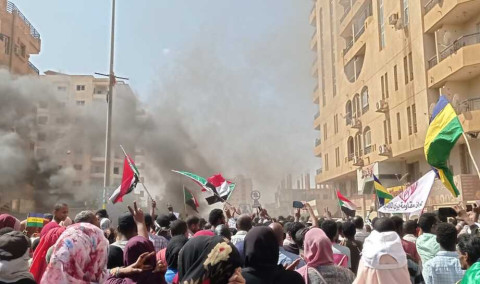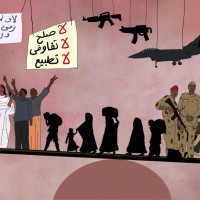The Sudan conflict An interview with Muzan Alneel
Muzan Alneel, a writer and public speaker in Sudan, shared some insights on recent developments in Sudan with TNI.

Osama Eid, CC BY-SA 3.0 <https://creativecommons.org/licenses/by-sa/3.0>, via Wikimedia Commons
You wrote a very informative article, Why “it hasn’t fallen yet”?, on developments in Sudan for TNI back in 2021 in which you identify, among other things, neoliberal economic policies, Gulf financial capital, Western interference and self-serving Sudanese elites as laying the grounds for the economic and political crisis. How have these elements contributed to the violent conflict today? And what other factors have been at play?
We can see the current war between the forces of Hemditi (the Rapid Support Forces (RSF)) and those of Alburhan (Sudanese Armed Forces or SAF) as the logical result of the growing powers of these two generals. The Sudanese resistance have worked since 2018 to weaken the power of all generals in Sudan. They chanted against the entire military council in 2019, against any immunity for the criminals of SAF, the RSF, the General Intelligence Service (NISS), the police, repeating the slogan ‘Oh military, there is no immunity, only the gallows or the dungeon’ يا عسكر مافي حصانة، يا المشنقة يا الزنزانة. The Sudanese resistance front announced in its ‘3 ‘=No’s’ slogan (no to negotiations, no to partnerships and no to legitimizing the coup plotters) that it would not legitimize the military coup by negotiating or compromising with it. The resistance remained loyal to this promise even as international diplomats pushed for meetings with the coup leaders.
National and international elites chose to increase the legitimacy and power of these generals. This was not a mistake. Their elitist projects required an alliance with a dictatorial leadership of armed militias, to use as weapons against the masses. National, regional and international investors require the armed militia to oppress the people so they can steal their resources, get access to land and water at cheap prices, control ports for profit, mine for gold, pollute the land, deplete underground water for export farming , and other exploitative economic and industrial policies that can only be passed under oppressive governments. This is true of Saudi Arabia, Egypt, the UAE, EU, USA and the UK governments as well as their investors.
The alliance of the national and international elite with the military dictatorship in Sudan, regardless of which civilian elite sides with which militia, is essential to their projects and is not a mistake.
The move towards a transition government in 2019 has not changed this underlying dynamic. The transitional government stood with investors against workers in the majority if not all incidences: industry and investment laws were changed to further accommodate large scale businesses, union law deliberations were dragged out and FFC union elections were never carried out. The international community supported austerity measures that minimized popular support for the transitional government. They also supported the Juba Peace Agreement (JPA) which brought in the leaders of armed movements from Darfur without addressing the issues impacting the people in conflict areas. The JPA signatories were among the first to announce their support for the coup of October 2021. Each incident and interaction in the past four years has the people aligned with their demands and the national and international elites aligned with the militias. This was clearest after the coup as the Sudanese people publicly rejected military rule (yet again!) and international diplomats and national elites raced to invent new names for a compromise with the military. The war Sudan is suffering today is fundamentally due to the SAF and RSF’s access to wealth and power and the legitimacy they receive from national and international elites.
Tell us more about the popular resistance committees that are organising against the war. What are their origins? How have they had to adapt to outright hostilities? Are they nationwide or concentrated in Khartoum?
From the first day of the war, many residents of Khartoum took to WhatsApp neighbourhood groups, resistance committees or other popular groups, to get reliable information, organise searches, ask for nearby help, water, power sources, as commuting across the city became more and more difficult due to the use of live ammunition and air strikes. They are using the tools that the resistance committees had built through their continuous organised work among the masses over the past four years.
In these groups, people are able to get information about safe routes and open bakeries, request medication or support for ill people. There are repeated calls to keep the groups for services only and not for politics, but with a city in the midst of a war, the separation between politics and services is almost impossible. Your access to breakfast might be blocked by the RSF. You may not get your first meal without dealing with a private militia financed by the state – and that is not even a metaphor.
Some groups have also been formed based on interest, focus area or professional capacity, such as health care workers. More than 20 health facilities around the capital were reopened, operated and supplied thanks to popular organised efforts. Outside the capital and the cities impacted by the war, there are popular organised efforts to provide housing for the displaced. Many Sudanese cities and villages are now housing guests from Khartoum (the city that previously was inhabited by more than 25% of the country’s population), organising evacuation and re-settlement
In your first piece you highlighted the role of foreign capital, particularly from the Gulf in propping up the regime and preventing systemic change. What has been the role of the EU and US and the UN? Is anyone working to support the resistance committees - either at state or popular level?
For a long time the so-called official international community tried to ignore the resistance committees, for example by supporting the Hamdook Burhan post-coup agreement despite the strong stance of the resistance front against another partnership with the military or any setup that maintains military control over wealth and power. The agreement failed, it had no power over the streets, and the prime minister resigned.
In the months following the failure of the Burhan Hamdook deal, international diplomats worked hard to recreate the previous negotiations and compromise processes. As they understood these agreements could not work without the support of the Resistance Committees, who remained committed to their position of 3 No’s, international diplomats tried to co-opt and corrupt the RCs, sending multiple invitations for meetings, organising indirect deliberations, and other techniques to compromise and legitimise the military coup and its generals. In early 2022, RCs accepted to attend one meeting on the condition of total transparency including providing Facebook live recording of the event. The UN Integrated Transition Assistance Mission in Sudan (UNITAMS) representatives however refused to allow transparency, so the meeting was cancelled.
International diplomats and local elites have worked to destroy the RCs and all forms of popular organising, in order to maintain control over political decisions and conversations which can be threatened by the voice of the organised public.
Thinking about how foreign mainstream media and think tanks are writing about Sudan, what do you feel are the big misconceptions?
I don’t think the issue with mainstream coverage is that of misconceptions, but rather deliberate deliverance of alternative history. Mainstream media have repeatedly neglected or misrepresented parts of the story of the Sudanese revolution and its organised peoples; in other words the most important part.
This could be seen in early 2019 where the media looked for iconic individuals to present as leaders who mobilised the public. This was never the case; it was the public that mobilised the revolution and provided some individuals with the capacity to take on certain actions or have their photo taken and go viral.
This pattern continues. A recent BBC report on a maternity ward operating despite the war in Khartoum failed to mention that it was actually reopened, operated and supplied by organised popular effort.
This is not necessarily the result of a conspiracy against the Sudanese people as much as an alliance against revolutionary popular efforts that shapes the tools and frameworks of the mainstream status quo. It also reflects journalism that does not accommodate or know how to document organised revolutionary efforts (they need a name of an entity, a leadership they can highlight, perhaps a headquarters as well). In general the interests of those funding and supporting the newspaper, TV channel or think tank must be considered and analysed when reviewing talks and news on Sudan or any other country.
How should the international community respond to the crisis? What would be a constructive and effective way forward to bring about both peace and democracy in Sudan?
First we must look at the experience and impact of the international community’s interventions in Sudan. We can start with their support for the partnership agreement between the national elite and the military in general, that they forced on the general public which rejected it in strikes and millions of marches. The agreement failed to deliver on any of its promises or any of the goals of the revolution: there was no social or economic justice, no criminal justice for the martyrs, no economic growth. The military partners’ coup was the icing on the many cakes of diplomatic failure. The failure comes on top of many other failures in the recent history of international diplomacy in Sudan. Therefore the first thing we need from the the international community is accountability and processes and institutions that are transparent and publicly governed. It is irrational to expect serious benefits from entities operating with no transparency or accountability. That must change, if these organisations are to have different values and priorities. Only then can we speak of a role for the international community in helping to support peace and democracy in Sudan.
What type of support can international progressive forces give to the people in Sudan? How can we ensure that the Sudanese unjust regime finally falls?
If Sudan is to be saved this can only be done by the efforts of the organised public, the people currently working to provide health services and water and housing to their communities through organised work. The people of Sudan will benefit if these organisations evolve out of these temporary forms into sustainable popular governance forms that can support and protect the livelihoods of the Sudanese people during and after the war. It can also threaten the possibilities and control of centralized dictatorships in the future. The national and international elites cannot tolerate structures of real democracy as their projects are designed around the oppression and theft of the wealth of the many by the few.
It is only rational to expect these elites to push regional and international anti democratic regimes and entities to bring this popular democratic experience to an end. The atrocity of international intervention in Sudan can only be minimized by international popular accountability and internal popular organising in Sudan.
Relacionados
Why “it hasn’t fallen yet”? Lessons from the Sudanese revolution
- Arab Uprisings
- Middle East and North Africa

Creditos
Autores
Article: Newsletter banner
¿Quieres estar informada?
Suscríbase al boletín para recibir actualizaciones mensuales sobre las investigaciones, eventos y publicaciones del TNI.
Boletín Suscribirse a nuestro boletín
Mas como esto
Why “it hasn’t fallen yet”? Lessons from the Sudanese revolution
- Arab Uprisings
- Middle East and North Africa

